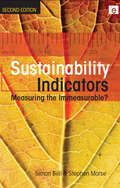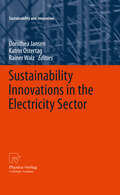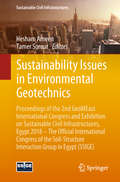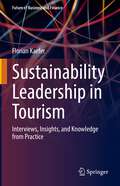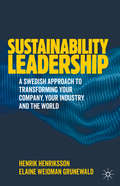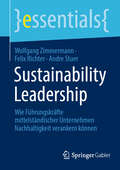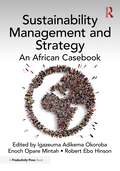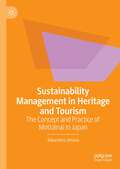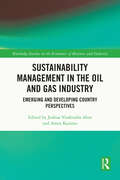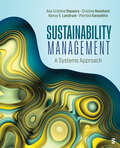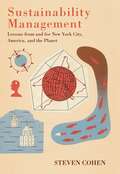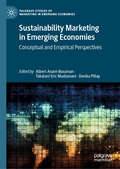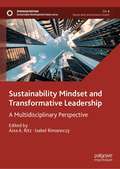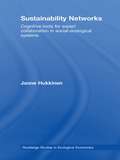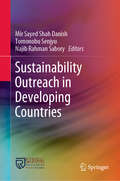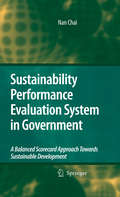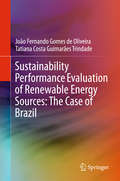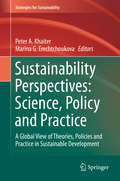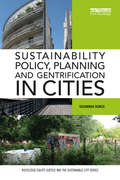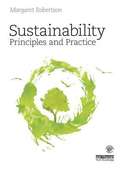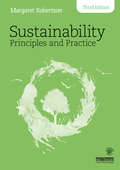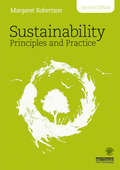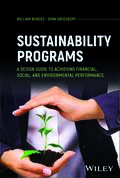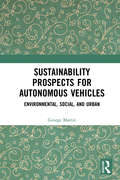- Table View
- List View
Sustainability Indicators: Measuring the Immeasurable?
by Stephen Morse Simon BellPraise for the first edition: 'This book should be of interest to anyone interested in sustainable development, and especially sustainability indicators. Bell and Morse easily succeed in exposing the fundamental paradoxes of these concepts and, more importantly, they offer us a way forward. Readers ... will find their practical recommendations for those attempting to do sustainability analysis in the field most welcome, which is also the book's greatest strength.' Local Environment: The International Journal of Justice and Sustainability 'This book makes a valuable contribution to the theory and practice of using indicators for sustainability. It introduces systems ideas and a range of tools and techniques that have the potential to broaden and deepen our understanding of a whole range of complex situations. Well worth a closer look.' Christine Blackmore, Open University 'This is a book that explores new ways of thinking about how to measure sustainability... It offers stimulating food for thought for environmental educators and researchers.' Environmental Education Research 'This book tells me, as an SI 'practitioner', where I have been and why, and more importantly how I should be thinking in order to effectively present to and empower the local community in the years ahead.' David Ellis, Principal Pollution Monitoring Officer, Norwich City Council 'A practical guide to the development of sustainability indicators which offers a systemic and participative way to use them at local scale. Our preliminary results are highly positive and the approach is applicable in many contexts.' Elisabeth Coudert, Programme Officer Prospective and Regional Development, Blue Plan The groundbreaking first edition of Sustainability Indicators reviewed the development and value of sustainability indicators and discussed the advantage of taking a holistic and qualitative approach rather than focusing on strictly quantitative measures. In the new edition the authors bring the literature up to date and show that the basic requirement for a systemic approach is now well grounded in the evidence. They examine the origins and development of Systemic Sustainability Analysis (SSA) as a theoretical approach to sustainability which has been developed in practice in a number of countries on an array of projects since the first edition. They look at how SSA has evolved into the practical approaches of Systemic Prospective Sustainability Analysis (SPSA) and IMAGINE, and, in particular, how a wide range of participatory methodologies have been adopted over the years. They also provide an assessment of the strengths and weaknesses of projects that undertake work in the general field of sustainable development.
Sustainability Innovations in the Electricity Sector
by Dorothea Jansen Katrin Ostertag Rainer WalzThe future of modern societies depends on their ability to deal with the challenge of climate change in the coming decades. One essential component is a better understanding of innovation processes in the energy sector. This book focuses on sustainability innovations in renewable energies, combined heat and power, and energy service contracting, and analyses the institutions, actors and functions within the innovation system. Of particular interest is the question of whether the joint effect of EU-driven market liberalization and climate policies will succeed in establishing market forces that will drive actors towards more climate-friendly energy production. A special focus is on the role of local utilities in the electricity sector as opposed to large transmission net operators or regional net operators. The countries covered in the contributions include Germany, Denmark, the UK, Switzerland, and the Netherlands.
Sustainability Issues in Environmental Geotechnics: Proceedings of the 2nd GeoMEast International Congress and Exhibition on Sustainable Civil Infrastructures, Egypt 2018 – The Official International Congress of the Soil-Structure Interaction Group in Egypt (SSIGE) (Sustainable Civil Infrastructures)
by Hesham Ameen Tamer SorourThis edited volume deals with the attempts made by the scientists and practitioners to address contemporary issues in geoenvironmental engineering such as characterization of dredged sediments, geomaterials and waste, valorization of waste, sustainability in waste management and some other geoenvironmental issues that are becoming quite relevant in today's world especially in view of the high urbanization rates, advancement in technologies, and changes in consumption behavior of people. In this regard, wastes generated through the daily activities of individuals and organizations pose many challenges in their management. The volume is based on the best contributions to the 2nd GeoMEast International Congress and Exhibition on Sustainable Civil Infrastructures, Egypt 2018 – The official international congress of the Soil-Structure Interaction Group in Egypt (SSIGE).
Sustainability Leadership in Tourism: Interviews, Insights, and Knowledge from Practice (Future of Business and Finance)
by Florian KaeferThis professional guidebook highlights sustainable tourism development and management for businesses and destinations. It presents a unique collection of expert interviews, combined with latest insights and thoughts on the most relevant topics and trends linked to sustainability in tourism, sustainable business management, and destination development. This is a book which offers inspiring personal stories and reflections, and at the same time serves as essential know-how guide for busy tourism entrepreneurs, managers, and developers who care about business resilience and the well-being of destination communities.
Sustainability Leadership: A Swedish Approach to Transforming your Company, your Industry and the World
by Henrik Henriksson Elaine Weidman GrunewaldAs CEOs and business leaders navigate a world of complex global challenges, sustainability is no longer optional but a business imperative. In this book, two sustainability leaders with decades of experience – Henrik Henriksson, CEO of Scania and Elaine Weidman Grunewald, Co-founder of the AI Sustainability Center, and former Chief Sustainability & Public Affairs Officer at Ericsson – offer a simple but powerful three-step model for leading an organization on a sustainability transformation journey that aims at big, audacious, world-changing goals.Honest about the dilemmas but bullish on the opportunities, the authors advise leaders on how to accelerate sustainability in their organizations told through a Swedish lens, where the country’s values and culture permeate the boardroom and the C-suite, bringing a unique clarity and conviction to leading with integrity.In practical insights gleaned from the authors’ own experience, the book takes leaders through the three phases of sustainability leadership: from establishing a solid foundation rooted in purpose, culture, values, principles and consistent, credible leadership, to integrating sustainability into the core business, and then to executing a vision that not only shifts the direction of the company but can change an entire industry, and even the world.Throughout the book, more than 25 interviews with other leading CEOs of Swedish companies as well as successful start-ups, investors, economists, and other experts illuminate the path to sustainability leadership from different perspectives. These are complemented by case studies describing how companies got it right – or turned themselves around after getting it very, very wrong. With this hands-on insiders’ guide, CEOs and C-suite leaders can take sustainability to the next level. This is the encouragement and inspiration business leaders need to move past incremental improvement at a time when exponential, world-changing action is more urgent than ever.
Sustainability Leadership: Wie Führungskräfte mitteltständischer Unternehmen Nachhaltigkeit verankern können (essentials)
by Wolfgang Zimmermann Felix Richter Andre StuerDas Buch zeigt, wie Mittelstands- und Familienunternehmen die Nachhaltigkeitswende ihres Unternehmens mit Hilfe von Sustainability Leadership meistern können. Denn zunehmende staatliche Vorgaben und die ökologische Transformation veranlassen viele Unternehmer dazu, sich aktiv mit dem Thema auseinanderzusetzen. Dabei stehen Unternehmen und Organisationen vor neuen Herausforderungen – alte Führungs- und Managementmuster passen nicht mehr. Als Führungskraft ist es nicht immer leicht, angesichts hoher Komplexität und Unsicherheit die Orientierung zu behalten und die eigene Unternehmensstrategie mit den Bedürfnissen von Mitarbeitenden und externen Stakeholdern in Einklang zu bringen. Die Autoren zeigen anhand von praxisnahen Beispielen und konkreten Werkzeugen einen ganzheitlichen und integrativen Leadershipansatz auf, wie Führungskräfte mittelständischer Unternehmen Nachhaltigkeit erfolgreich in ihrem Unternehmen verankern können. Besonders bemerkenswert: Dies kann die Geburtsstunde eines „Unternehmertum 2.0“ sein. Es basiert auf den oftmals tiefen Wurzeln des Unternehmens und neuen, innovativen Perspektiven. Interviews mit Unternehmerpersönlichkeiten vermitteln Impulse und geben Einblicke zu ihren Erfahrungen mit der Nachhaltigkeitstransformation.
Sustainability Management and Strategy: An African Casebook
by Robert Ebo Hinson Enoch Opare Mintah Igazeuma Adikema OkorobaWith Africa predicted to emerge as a leading market in the coming years, the debate on sustainability, especially on the mitigation of business impact on the continent’s environment and society, cannot be underestimated. Prior to the worsening impact of climate change, the continent has historically been struggling to consolidate sustainability efforts in driving social and environmental protection caused by both foreign (majorly) and local business activities in the region. To capture current social and environmental injustice plaguing the African continent, Secretary‑General Prof. Petteri Taalas of the World Meteorological Organization (WMO) opined that "Africa is responsible for less than 10 percent of global greenhouse gas emissions, but it is the continent which is the least able to cope with the negative impacts of climate change. Heatwaves, heavy rains, floods, tropical cyclones, and prolonged droughts are having devastating impacts on communities and economies, with increasing numbers of people at risk."Sustainability Reporting Frameworks have empowered sustainability leaders, most especially Chief Sustainability Officers (CSOs), in organizations to develop practical strategies for leading sustainability‑related issues while driving systemic change for collective thinking towards mitigating the impact of climate change on society and the environment. While there is undoubtedly a plethora of standards, codes, and toolkits to help frame the sustainability drive, with leading CSOs around the globe sharing their lived experiences, the narrative for best practices, and what the content of sustainability initiatives and reporting should be have been skewed to the Western or advanced economies’ narrative. This reporting has drowned out other continent‑specific narratives that offer a diverse pool of perspectives and locally rich content on some sustainability actions and achievements, especially from CSOs. The role of business sustainability leaders and CSOs in Africa in positioning the continent as the "market of tomorrow" with sound and robust sustainability practices needs to be spotlighted. Owing to the gap, this book brings the urgency to light through case studies and stories from leading African businesses, while capturing their sustainability strategies and achievements. This book moves beyond the experience and context of business in advanced economies and responds to the need for an alternative narrative of sustainability leadership in Africa. The focus of this book is on the role of sustainability leadership over the last decade and discusses the contributions and challenges of navigating this multi‑disciplinary function in different sectors. The authors share their insight into this under‑researched and under‑reported perspective highly relevant to business and sustainability, and environmental, social, and governance (ESG) reporting in a growing region like Africa.
Sustainability Management in Heritage and Tourism: The Concept and Practice of Mottainai in Japan
by Takamitsu JimuraIncreasingly, the tourism industry is looking towards sustainability, responding to public demand and local environmental policy. This monograph explores the concept of sustainability in the context of heritage and tourism studies, as well as examining the practices adopted to realize or enhance the sustainability of these industries. Beginning with a broad overview, outlining the theory and scholarly landscape, this book then focuses on cases of sustainable tourism in Japan, exploring the concept of ‘mottainai’. Mottainai is a traditional Japanese term and means an ethical attitude towards the use of a range of resources needed for human life. This Japanese word can be understood as ‘what a waste’, and can promote the environmentally-friendly way of life, encouraging reduce, reuse and recycle.This book will be of interest to scholars and students of heritage, tourism, and sustainability management; both those interested in Japan specifically, and those who are interested in new approaches for sustainability in tourism management.
Sustainability Management in the Oil and Gas Industry: Emerging and Developing Country Perspectives (Routledge Studies in the Economics of Business and Industry)
by Joshua Yindenaba Abor Amin KarimuThe oil and gas industry is a complex sector with significant reach in terms of providing the energy needs of the global economy and the security, environmental and development consequences thereof. In particular, the sector is extremely important for the economic growth of emerging markets and developing countries. Furthermore, the life span of oil and gas resources is finite, with high health and safety risks and substantial environmental costs that require careful management and sustainability practices to ensure optimal extraction and utilisation of these resources. This book examines the challenges and opportunities in the oil and gas industry, in the context of emerging markets and developing economies. It provides comprehensive coverage of the management and sustainability practices of the sector, the environmental impact and sustainability of resources as well as the businesses that operate in the sector across the entire value chain. It addresses the current discourse on topics such as the Sustainable Development Goals, the Green Economy, the Paris Agreement and Glasgow Climate Pact and concludes with a chapter on the future of the oil and gas industry. The discussions around energy and energy transitions in particular continue to gain momentum and the book provides a wide-reaching and up-to-date overview of the industry. The book introduces readers to the concepts and formal models of analysis in the oil and gas sector and will serve as a useful resource for students, scholars and researchers in operations, marketing, procurement and supply chain management, project management, health and safety management, environmental economics, natural resource economics, development finance, and development studies. Researchers and practitioners working in these areas will also find the book a useful reference material.
Sustainability Management: A Systems Approach
by Ana Cristina Siqueira Cristina Neesham Nancy E. Landrum Patricia KanashiroConsumer demand for sustainable business practices has never been greater. Sustainability Management uses a systems thinking approach to illustrate the interdependencies among ecosystems, societies, organizations, and individuals. Authors Ana Cristina Siqueira, Cristina Neesham, Nancy E. Landrum, and Patricia Kanashiro explain why sustainability presents risks and opportunities for businesses, how sustainability can be a source of competitive advantage, and the business impact on the environment and society. This timely new text examines some of today’s most pressing issues including social justice, racial equity, human rights, and climate crisis. Case Studies tied to UN Sustainable Development Goals spotlight innovative sustainable strategies from companies around the world.
Sustainability Management: A Systems Approach
by Ana Cristina Siqueira Cristina Neesham Nancy E. Landrum Patricia KanashiroConsumer demand for sustainable business practices has never been greater. Sustainability Management uses a systems thinking approach to illustrate the interdependencies among ecosystems, societies, organizations, and individuals. Authors Ana Cristina Siqueira, Cristina Neesham, Nancy E. Landrum, and Patricia Kanashiro explain why sustainability presents risks and opportunities for businesses, how sustainability can be a source of competitive advantage, and the business impact on the environment and society. This timely new text examines some of today’s most pressing issues including social justice, racial equity, human rights, and climate crisis. Case Studies tied to UN Sustainable Development Goals spotlight innovative sustainable strategies from companies around the world.
Sustainability Management: Lessons from and for New York City, America, and the Planet
by Steven CohenCan we grow our world economy and create opportunities for the poor while keeping the planet intact? Can we maintain our vibrant, dynamic lifestyles while ensuring the Earth stays productive and viable? Aimed at managers, students, scholars, and policymakers, Sustainability Management answers these questions in the affirmative, arguing it is possible for environmentally sustainable business practices and policies to foster economic and long-term growth. Written by a former analyst and consultant with the EPA, this book originally combines sustainable efforts in water, agriculture, urban, and power management to achieve-in practice, not just in theory-a sustainable planet and economy. Steven Cohen begins with the technical, financial, managerial, and political challenges of such a project, and then honestly assesses sustainable practices in the manufacturing and service industries. He addresses renewable and carbon-free energy production; water sustainability, especially with regard to energy issues involving filtration, distribution, and changing rainfall patterns; food cultivation and distribution; and ways to maintain the interdependent systems on which we depend to live. Taking examples from New York City, one of the most sustainable and sustainability-minded metropolises in the world, Cohen explains how everything from construction to waste management can be designed to facilitate a sustainable environment, not just for New York but also for the world. He concludes with this macroscopic view, outlining the global efforts necessary to preserve biodiversity and ecosystems, and the impact of war, terrorism, and human conflict on sustainability.
Sustainability Marketing in Emerging Economies: Conceptual and Empirical Perspectives (Palgrave Studies of Marketing in Emerging Economies)
by Albert Anani-Bossman Takalani E. Mudzanani Devika PillayThis book addresses the environmental, social, and economic challenges that corporations in emerging economies face, focusing on sustainability marketing as a paradigm-shifting approach. Drawing from cases across several emerging economies, including South Africa, Ghana, Nigeria, and Turkey, it examines how organisations can create long-term societal value through sustainable practices. Reflecting the increasing pressure for organisations to adopt sustainability practices, the need for this book is rooted in what organisations in emerging economies stand to gain from the adoption and implementation of sustainable marketing strategies. Chapters address consumer behaviour and demonstrate best practices for integrating sustainability into marketing strategies. The opportunities and challenges associated with implementing sustainability strategies post-COVID are also explored. This book, therefore, offers essential pathways and shares evidence of sustainability marketing. Covering topics such as the sustainability marketing mix, social marketing, sustainable consumption, and the role of communication, it is a valuable contribution to the ongoing discussion on sustainability from the perspective of emerging economies.
Sustainability Mindset and Transformative Leadership: A Multidisciplinary Perspective (Sustainable Development Goals Series)
by Isabel Rimanoczy Aixa A. RitzThis volume examines the importance of leadership in developing an effective sustainability strategy. It defines the sustainability mindset and surveys the primary motivations, conditions, or environment(s) that cause leaders to embrace sustainable practices. As described in the UN Sustainable Development Goal 8, embracing the sustainability mindset will lead to greater productivity and promote economic growth.Organized into themes of organizational operations, leadership competencies, and leadership practices, the chapters, written by contributors representing global perspectives, tackle topics such as strategy, culture, and leadership styles in developing a new form of mindfulness for leaders as well as organizations. Recognizing the need for accelerated change in organizations as well as society at large, this book presents scholars with a framework for establishing a mindset for sustainability to foster much-needed transformative leadership.
Sustainability Networks: Cognitive Tools for Expert Collaboration in Social-Ecological Systems (Routledge Studies in Ecological Economics #1)
by Janne HukkinenSustainability is a word that means different things depending on who is using it, thus underlining the potential problems involved in experts from different fields teaming up to tackle sustainability problems. In this book, Janne Hukkinen argues for a reflexive approach to sustainability as a means of coming to grips with the threatening challenges arising out of human-environment interaction. The author illustrates his argument with a case study of natural resource management in Lapland, showing how sustainability is understood holistically by academics and professionals alike. This book reflects an emerging cognitive turn in sustainability sciences, conceptualizing environmental challenges during action on our social and material environments, rather than in isolation. Hukkinen argues that this conceptual blending enables sustainability experts to hybridize themselves: to immerse themselves in the fields of other experts and imagine the other's work - both prerequisites of trans-disciplinary knowledge integration. This book shows how sustainability experts can reveal their intellectual engagements when designing scenarios and indicators and presents a rigorous framework for organizing expert collaboration.
Sustainability Outreach in Developing Countries
by Tomonobu Senjyu Mir Sayed Shah Danish Najib Rahman SaboryThis book presents a comprehensive collection of recent research on the timely topic of sustainable development goals, with a focus on developing countries. In this manner, it furnishes interdisciplinary coverage in terms of sustainable development; it sets forth the pillars of sustainability (environmental, technical and technological, social, institutional, and economic disciplines); and it explores the adaption of these pillars for long-term sustainability.With its survey of transboundary research, experiences, and lessons learned, the book offers integrated conceptual and empirical contributions from diverse interrelated fields. Viable options are set forth for societies in transition in the twenty-first century to achieve well-being in the lives of their people through the eradication of poverty, mitigation of climate change, promotion of lifelong learning opportunities, and empowerment of society. These options also make it possible to deploy affordable energy, sustain economic growth, offer innovation, reduce inequality, and finally, to help ensure global sustainability.
Sustainability Performance Evaluation System in Government: A Balanced Scorecard Approach Towards Sustainable Development
by Nan ChaiProgressing towards sustainable development raises important challenges to conducting performance evaluations in governments because there are neither generally accepted methods nor specific standards to be met at present. Sustainability Performance Evaluation System in Government, makes a conceptual contribution to public sustainability performance evaluation and develops a set of framework indicators with the help of the strategic and comprehensive approach "Sustainability Balanced Scorecard". As a conceptual basis for the further research and application, this volume will be of great interest to researchers and practitioners at many levels of environmental / sustainability, public management and strategic control studies. Evaluators will find methodological approaches and applied tools for their work. Decision-makers and managers will find it valuable to manage the social, economic and environmental issues in a balanced and integrated manner. Governments will also find it helpful in assisting them in establishing an evaluation system towards sustainable development.
Sustainability Performance Evaluation of Renewable Energy Sources: The Case of Brazil
by João Fernando Oliveira Tatiana Costa TrindadeThis book presents a unique analysis of the sustainability performance of various renewable energy sources, based on Brazilian case studies. The evaluation also covers the potential held by regions with diverse socioeconomic and environmental characteristics and how they affect the development of each source. Considering that energy is essential to sustaining and improving modern society, the answer to the current energy dilemma lies in the development of a system that comprises multiple renewable, reliable, and sustainable energy sources. Brazil, which has a predominantly renewable electricity grid, has the privilege of being home to a range of different sustainable sources, although most of its electricity comes from hydroelectric power plants. With that in mind, this book has the primary objective of developing a performance evaluation system for important renewable sources in Brazil (solar, wind, and hydro), taking into account different scenarios and investor profiles. The analysis is based on the study of sustainability indicators related to the technical, economic, social and environmental aspects of the evaluated energy systems. As the availability of renewable sources is very location-specific, the scope of this book covers two Brazilian States with distinct characteristics. It makes it possible to determine which renewable energy source is most adequate from a sustainability perspective, and in light of the analyzed scope and investor profile.
Sustainability Perspectives: A Global View of Theories, Policies and Practice in Sustainable Development (Strategies for Sustainability)
by Peter A. Khaiter Marina G. ErechtchoukovaThe book presents methodological and applied aspects of sustainability and sustainable management from different countries and regions around the globe. It discusses approaches to sustainability assessment, demonstrates how ideas of sustainability and sustainable management are incorporated into public policies and private actions at local and national levels. Authors focus on promoting greater sustainability in natural resource management, energy production and storage, housing design, industrial reorganization, coastal planning, land use, and business strategy, including sustainability indicators, environmental damages, and theoretical frameworks. Chapters reflect environmental, economic and social issues in sustainable development, challenges encountered, and lessons learned as well as solutions proposed.
Sustainability Policy, Planning and Gentrification in Cities (Routledge Equity, Justice and the Sustainable City series)
by Susannah BunceSustainability Policy, Planning and Gentrification in Cities explores the growing convergences between urban sustainability policy, planning practices and gentrification in cities. Via a study of governmental policy and planning initiatives and informal, community-based forms of sustainability planning, the book examines the assemblages of actors and interests that are involved in the production of sustainability policy and planning and their connection with neighbourhood-level and wider processes of environmental gentrification. Drawing from international urban examples, policy and planning strategies that guide both the implementation of urban intensification and the planning of new sustainable communities are considered. Such strategies include the production of urban green spaces and other environmental amenities through public and private sector and civil society involvement. The resulting production of exclusionary spaces and displacement in cities is problematic and underlines the paradoxical associations between sustainability and gentrified urban development. Contemporary examples of sustainability policy and planning initiatives are identified as ways by which environmental practices increasingly factor into both official and informal rationales and enactments of social exclusion, eviction and displacement. The book further considers the capacity for progressive sustainability policy and planning practices, via community-based efforts, to dismantle exclusion and displacement and encourage social and environmental equity and justice in urban sustainability approaches. This is a timely book for researchers and students in urban studies, environmental studies and geography with a particular interest in the growing presence of environmental gentrification in cities.
Sustainability Principles and Practice
by Margaret RobertsonSustainability Principles and Practice gives an accessible and comprehensive overview of the interdisciplinary field of sustainability. The focus is on furnishing solutions and equipping the student with both conceptual understanding and technical skills for the workplace. Each chapter explores one aspect of the field, first introducing relevant theory and presenting issues, then supplying tools for working toward solutions. Elements of sustainability are examined piece by piece, and wide coverage ranges over ecosystems, social equity, environmental justice, food, energy, product life cycles, cities, and more. Techniques for management and measurement as well as case studies from around the world are provided. Chapters include further reading, discussion questions, and problems to foster quantitative thinking. The book is supported by a companion website with key website links, detailed reading lists, glossary, and additional case studies, together with numerous projects, research problems, and group activities, all of which focus on real-world problem solving of sustainability issues. The textbook is designed to be used by undergraduate college and university students in sustainability degree programs and other programs in which sustainability is taught.
Sustainability Principles and Practice
by Margaret RobertsonSustainability Principles and Practice gives an accessible and comprehensive overview of the interdisciplinary field of sustainability. The focus is on furnishing solutions and equipping students with both conceptual understanding and technical skills. Each chapter explores one aspect of the field, first introducing concepts and presenting issues, then supplying tools for working toward solutions. Elements of sustainability are examined piece by piece, and coverage ranges over ecosystems, social equity, environmental justice, food, energy, product life cycles, cities, and more. Techniques for management and measurement as well as case studies from around the world are provided. The 3rd edition includes greater coverage of resilience and systems thinking, an update on the Anthropocene as a formal geological epoch, the latest research from the IPCC, and a greater focus on diversity and social equity, together with new details such as sustainable consumption, textiles recycling, microplastics, and net-zero concepts. The coverage in this edition has been expanded to include issues, solutions, and new case studies from around the world, including Europe, Asia, and the Global South. Chapters include further reading and discussion questions. The book is supported by a companion website with online links, annotated bibliography, glossary, white papers, and additional case studies, together with projects, research problems, and group activities, all of which focus on real-world problem-solving of sustainability issues. This textbook is designed to be used by undergraduate college and university students in sustainability degree programs and other programs in which sustainability is taught.
Sustainability Principles and Practice: Principles And Practice
by Margaret RobertsonSustainability Principles and Practicegives an accessible and comprehensive overview of the interdisciplinary field of sustainability. The focus is on furnishing solutions and equipping the student with both conceptual understanding and technical skills for the workplace. Each chapter explores one aspect of the field, first introducing relevant theory and presenting issues, then supplying tools for working toward solutions. Elements of sustainability are examined piece by piece, and wide coverage ranges over ecosystems, social equity, environmental justice, food, energy, product life cycles, cities, and more. Techniques for management and measurement as well as case studies from around the world are provided. Chapters include further reading, discussion questions, and problems to foster quantitative thinking. The book is supported by a companion website with key website links, detailed reading lists, glossary, and additional case studies, together with numerous projects, research problems, and group activities, all of which focus on real-world problem solving of sustainability issues. The textbook is designed to be used by undergraduate college and university students in sustainability degree programs and other programs in which sustainability is taught.
Sustainability Programs: A Design Guide to Achieving Financial, Social, and Environmental Performance
by William Borges John GrosskopfGo-to guidance for designing, implementing, and managing effective sustainability programs and their management systems Moving past vague concepts, buzzword overloads, superficial efforts, and flavor-of-the-month misdirections, Sustainability Programs presents a pragmatic, step-by-step approach to creating and managing adaptable, organization-wide sustainability programs to achieve People, Planet, and Profit (3P) objectives with least cost, effort, and risk. Key steps covered in this book include reaching a programmatic “Go” decision, developing sustainability policies, designing an organizational framework, defining the most pressing sustainability needs, and cascading 3P goals, tactics, targets, and initiatives into business units, functions, and departments to create new capabilities and improve performance. By following the principles and practices in this book, any organization can better achieve sustainability’s full promise of social responsibility, environmental stewardship, and financial performance. Written by authors with a wealth of practitioner experience in the field, Sustainability Programs explores topics including: Creating social, environmental, and financial strategies, tactics, targets, and initiatives that create new capabilities and resolve 3P performance issuesAvoiding ad hoc projects that fail to address critical sustainability issues, wasting valuable resources and squandering competitive advantagesOvercoming technical professionals’ lack of business management experience and helping management professionals understand sustainability’s benefits and intricaciesUnderstanding sustainability through the management lenses of risk reduction, improved efficiencies through eradication of wastes, increased revenues via innovation, and enhanced competitive advantages fueled by greenwash-free transparency.Responding to the demanding data capture, analysis, and reporting challenges of environmental, social, and governance (ESG). Acknowledging that one size does not fit all, this book delivers individual concepts and methods adaptable across any organization’s value chains. It is an essential read for leaders and practitioners working within private and public enterprises of all types and sizes, especially those with 2,000 to 5,000 employees.
Sustainability Prospects for Autonomous Vehicles: Environmental, Social, and Urban
by George T. MartinThe Autonomous Vehicle (AV) has been strongly heralded as the most exciting innovation in automobility for decades. Autonomous Vehicles are no longer an innovation of the future (seen only in science fiction) but are now being road-tested for use. And yet while the technical and economic success and possibilities of the AV have been widely debated, there has been a notable lack of discussion around the social, behavioural, and environmental implications. This book is the first to address these issues and to deeply consider the environmental and social sustainability outlook for the AV and how it will impact on communities. Environmental and social sustainability are goals unlike those of technical development (a new tool) and economic development (a new investment). The goal of sustainability is development of societies that live well and equitably within their ecological limits. Is it reasonable and desirable that only technical and economic success comprise the swelling AV parade, or should we be looking at the wider impacts on personal well-being, wider society, and the environment? The uptake for AVs looks to be lengthy, disjointed, and episodic, in large measure because it faces a range of known unknown risks. This book assesses the environmental and social sustainability potential for AVs based on their prospective energy use and their impacts on climate change, urban landscapes, public health, mobility inequalities, and individual and social well-being. It examines public attitudes about AV use and its risk of fostering a rebound effect that compromises potential sustainability gains. The book concludes with a discussion of critical issues involved in sustainable AV diffusion.
